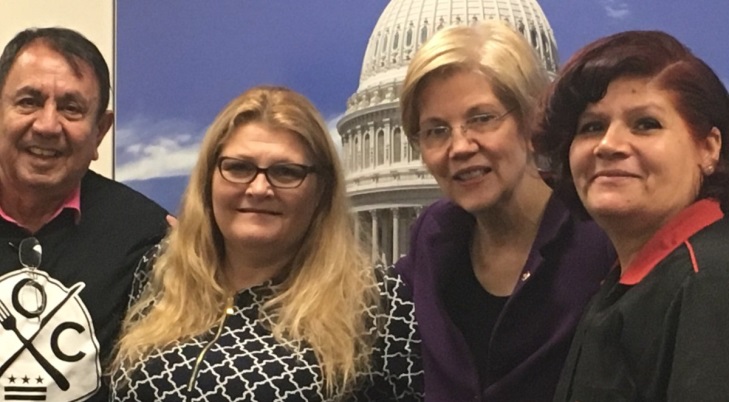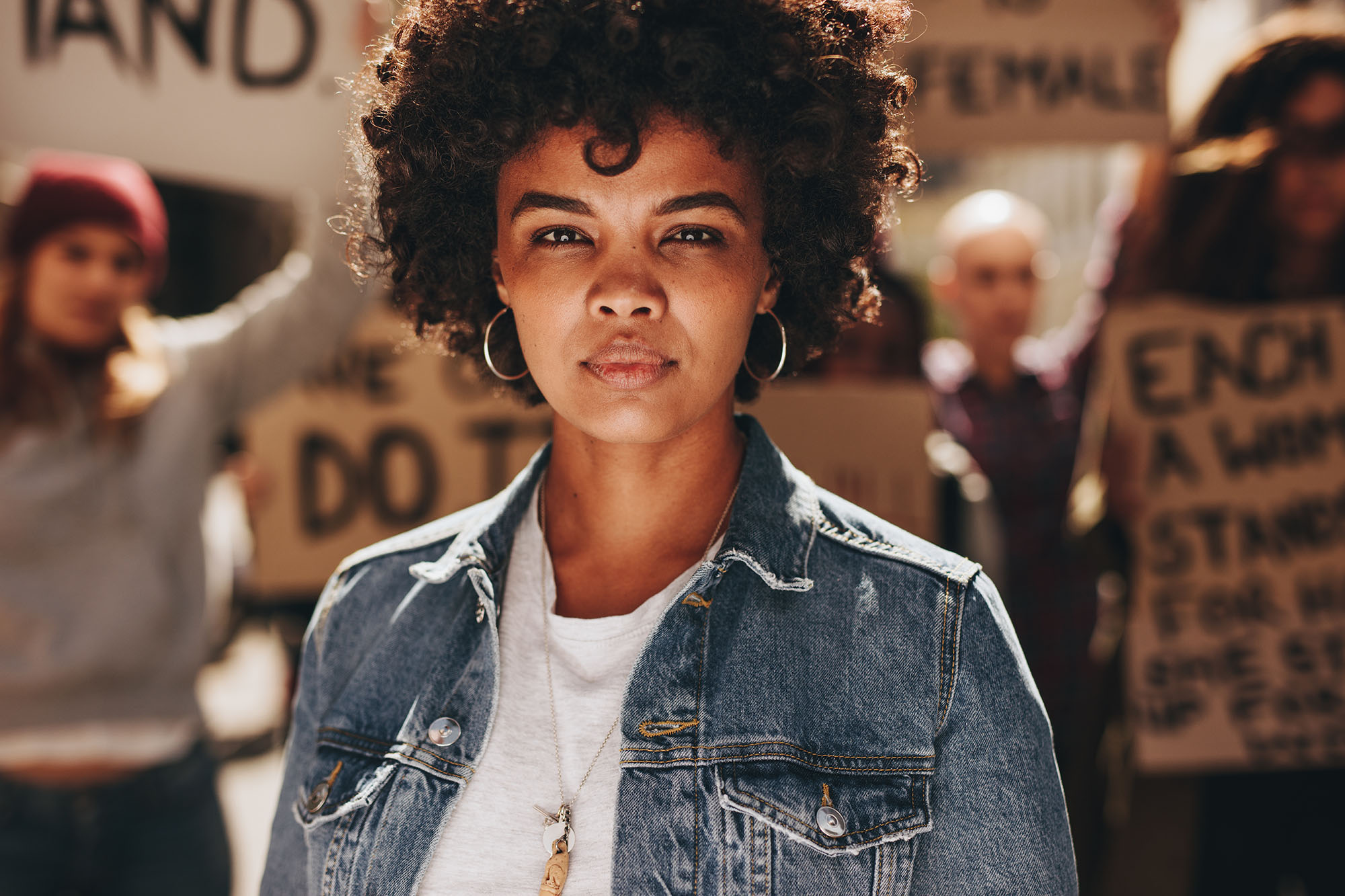Abortion rights, women of color, and LGBTQI+ people are under attack. Pledge to join us in fighting for gender justice.
Tarana Burke and Notable Movement Leaders Launch #MeTooVoter Campaign on 2nd Anniversary of The Viral #MeToo Moment
For immediate release: October 15, 2019
Contact: LySaundra Campbell ([email protected])
Ahead of Tuesday’s Democratic presidential debate, ‘me too.’ Movement founder Tarana Burke is joined by American labor activist Ai-jen Poo, President & CEO of the National Women’s Law Center Fatima Goss Graves, and civil rights attorney Mónica Ramírez to announce a campaign urging politicians to answer critical questions about sexual violence.
(New York, N.Y.) To commemorate the second anniversary of the viral #MeToo movement, Tarana Burke, founder of The ‘me too.’ Movement, joined Fatima Goss Graves of the National Women’s Law Center, Ai-jen Poo of the National Domestic Workers Alliance, and Mónica Ramírez of Justice for Migrant Women to create #MeTooVoter, an online campaign designed to pressure political leaders to put forward real solutions to address and prevent sexual violence and harassment. The campaign will push elected leaders and candidates to develop solid policy proposals that will support survivors’ healing, provide necessary services and benefits, invest in prevention, and reform legal protections to ensure that they cover all survivors, regardless of the kind of sexual violence or harassment they experienced or where they experienced it.
To date, none of the remaining presidential candidates have made addressing sexual violence and harassment a significant part of their platforms and the issue has been absent in the presidential primary debates. Burke, Goss Graves, Ramirez and Poo believe that survivors everywhere deserve to know what candidates propose to do to ensure safety and dignity at work, at school, and in communities.
“It’s imperative that all of the presidential candidates and others in public service realize that survivors are constituents who work, pay taxes and contribute to society every single day so the issues that impact us should be taken seriously,” Tarana Burke said. “#MeTooVoter is intended to create multiple channels of engagement, from social media to on-the-ground conversations in communities around the country. We’re calling on candidates to layout their specific plans to address sexual violence and to take action on the pending policy proposals that would also support survivor.”
While ‘me too.’ created necessary opportunities for survivors to share in and lead conversations about the impact sexual violence has on our communities, Burke, Goss Graves, Ramírez and Poo believe that this political moment requires a deeper dive into dissecting how sexual violence intersects with other systemic issues.
“We’re in the midst of an unprecedented cultural conversation about sexual violence and harassment, and about gender and power,” said Fatima Goss Graves, President and CEO of the National Women’s Law Center. “When #MeToo went viral, hundreds of thousands of people courageously spoke out about the ways in which they had been harmed and the ways institutions had let them down. Their experiences demand systemic solutions, and now is the time for voters to come together and tell our lawmakers that we are waiting to hear how they will answer this call.”
One of the campaign’s goals is to see sexual violence addressed as a central topic in the next round of presidential townhalls and debates. Burke, Goss Graves, Ramírez and Poo hope that survivors feel more empowered to have these conversations with the elected officials and candidates in their communities as well.
Leaders who want to represent us should consistently address our concerns and reflect our values,” said Ai-jen Poo, director of the National Domestic Workers Alliance and co-founder of Supermajority. #MeTooVoter is a call to all political leaders to recognize the power of survivors as constituents and their responsibility to prioritize ending sexual violence.
New survey data commissioned by the National Women’s Law Center show a supermajority of voters across party lines and sex want lawmakers to change the law to better address and prevent sexual harassment on the job. A full two thirds of voters surveyed (66 percent) agree lawmakers must take action to address sexual harassment.
“In the months after #MeToo went viral, political leaders expressed their commitment to take action to support survivors,” said Mónica Ramírez, President of Justice for Migrant Women and Gender Justice Campaigns Director for National Domestic Workers Alliance. “And now, two years later, their words have yet to materialize into enough significant support for survivors. Political leaders and candidates must treat this issue as one of the most pressing social, health, economic and safety issues of all time. Survivors are powerful and demand action. Through #MeTooVoter, we are calling on survivors and allies to use our collective power to hold political leaders and candidates accountable at the ballot box and in their overall leadership.”
###
For more information about #MeTooVoter or to speak with any of the leaders, please contact [email protected] and [email protected]
The ‘me too’ Movement supports survivors of sexual violence and their allies by connecting survivors to resources, pursuing a ‘me too.’ policy platform, and organizing survivors and supporters to interrupt sexual violence in their communities. As the ‘me too’ movement affirms empowerment through empathy and community-based action, the work is survivor-led and specific to the needs of different communities.
The National Women’s Law Center fights for gender justice — in the courts, in public policy, and in our society — working across the issues that are central to the lives of women and girls. We use the law in all its forms to change culture and drive solutions to the gender inequity that shapes our society and to break down the barriers that harm all of us — especially those who face multiple forms of discrimination, including women of color, LGBTQ people, and low-income women and families. For more than 45 years, we have been on the leading edge of every major legal and policy victory for women. Find out more at NWLC.org.
National Domestic Workers Alliance (NDWA) is the leading voice for dignity and fairness for millions of domestic workers in the United States. Founded in 2007, NDWA works for respect, recognition and inclusion in labor protections for domestic workers, the majority of whom are immigrants and women of color. NDWA is powered by over 60 affiliate organizations and local chapters and by a growing membership base of nannies, house cleaners and care workers in over 20 states. NDWA has created Alia, an online platform to help domestic workers access benefits, not otherwise granted to them, in addition to proposing a National Domestic Workers Bill of Rights with Senator Kamala Harris and Congresswoman Pramila Jayapal.
Justice for Migrant Women uses education, public awareness and advocacy in order to ensure that all migrant women are guaranteed human and civil rights, including the freedom of mobility, the ability to live and work with dignity, and the right to be free of threats of violence against them and their families, whether they are migrating across borders, around regions or within states. Justice for Migrant Women was created in 2014 by leading activist, Mónica Ramírez, to further scale the project she created in 2003 as the first legal project in the US focused on sexual harassment and other forms of gender discrimination against farmworker and other migrant women workers.





